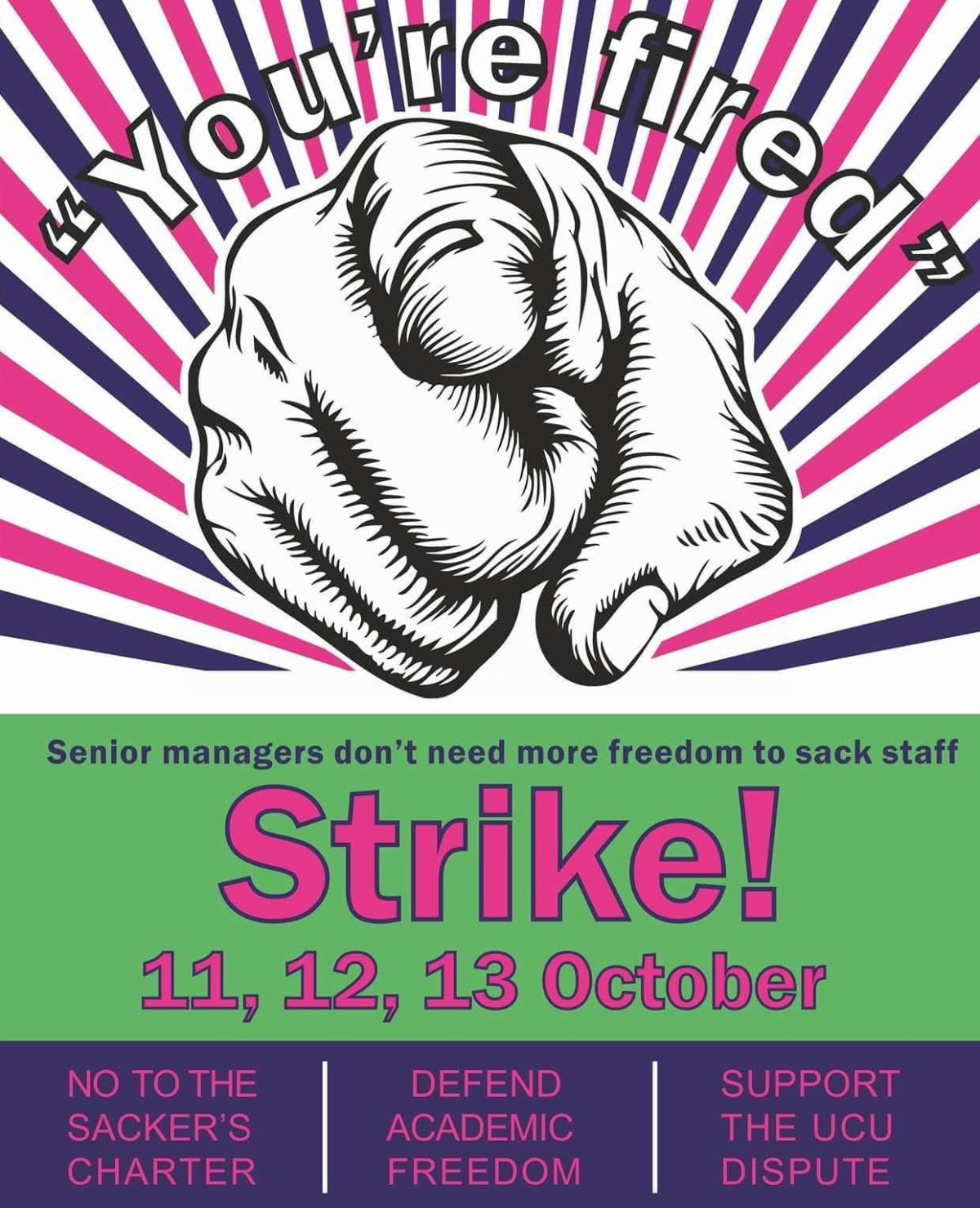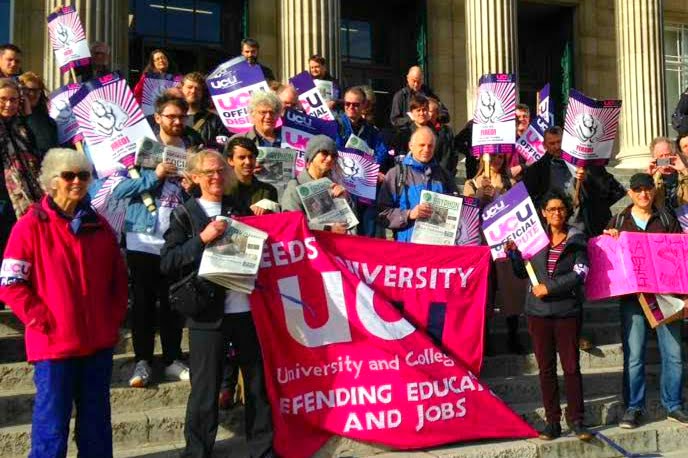UCU members at the University of Leeds were on strike last week, on 11-13th October. Eoin Breathnach of the Leeds UCU (personal capacity) discusses the fight against the marketisation and casualisation of Higher Education, and against an aggressive management that is looking to unfairly stack the odds in their favour.
UCU members at the University of Leeds were on strike last week, on 11-13th October.
Various aspects of the academic staff’s conditions are being threatened by changes to university statutes, but the most concerning issue is the Some Other Substantial Reason statute, which management are hoping to add to the dismissal clauses for vague reasons of “modernising” employment contracts.
University workers understand this SOSR statute actually constitutes a significant threat to academic freedom and job security. The action follows a one-day strike early in the summer, and long negotiations with university management.
This attack comes amidst a wave of changes in Higher Education that undermine the university mission to provide free and open spaces for research, learning, and teaching. Instead, universities are increasingly trying to mould academic staff and their research to suit private interests and the balance sheets of profit-making companies.
Staff’s right to criticise academic institutions – their own and others – are being stifled; the measurement of their teaching quality is becoming more demanding; and we are moving toward a situation where research is subordinated to the demands of private business. While university students are being turned into indebted consumers by tuition fees, staff are becoming cogs in a machine which produces only skilled, disciplined workers and plentiful profits for the few.
The fight against casualisation
The Some Other Substantial Reason statute has been introduced at some other institutions already, often being slipped into contracts under the nose of the unions. Wherever it has been introduced, there are reports of victimisation of staff and unfair sackings.
In particular, the statute is a threat to staff who report racism, demand gender equity, and ask for adjustments for their disabilities. Under this rule, “troublemaking” of any kind will be discouraged as employment becomes more unstable. Nevertheless, the University of Sheffield has demonstrated that these changes can be resisted successfully and managements can be made to back down.
The strike represents an historic moment for the University of Leeds UCU branch, being the longest strike in its recent history, and also a very successful one. Turnout at this stage seems to have been good, with every entrance to the vast campus picketed on the first day of the strike, and solid turnouts for pickets on the subsequent days.
Constructive and friendly conversations have been had with students and with university workers from the other unions on campus, as well as a petition being signed and postcards sent to the Vice Chancellor (whose £285, 000 per annum salary is in stark contrast with the conditions of most workers at the university and elsewhere).
Media both local and national have reported on the dispute, and support has been expressed by local MPs Hilary Benn (who visited the picket on Friday) and Alex Sobel, and by the Shadow Chancellor John McDonnell.
What’s more, in the wider industrial context of building anger against casualisation, and with the successful campaigns by Deliveroo workers and SOAS cleaners, there is every reason for optimism in the possibility of victory.
Boycott on the cards
 Another notable aspect of the dispute has been the “Striking Insights” teach-out event which has occupied the afternoons of the strike days. In this programme of alternative lectures hosted off campus, students, strikers, and members of the public have been invited to hear research-related lectures from leading academics and have engaged in political discussions on issues including the history and future of strike action, the place of migrant workers, and LGBT campaigns.
Another notable aspect of the dispute has been the “Striking Insights” teach-out event which has occupied the afternoons of the strike days. In this programme of alternative lectures hosted off campus, students, strikers, and members of the public have been invited to hear research-related lectures from leading academics and have engaged in political discussions on issues including the history and future of strike action, the place of migrant workers, and LGBT campaigns.
While the strike has been an important “negative” action – the withdrawal of labour from the university – this teach-out has provided an important “positive” action, showing what a really free and public education system could look like. Attendances at these events have been somewhat narrowly-based, drawing in many already-committed activists; nevertheless, it is clear that – if placed on a more stable organisational footing – it could provide the basis for a “Free University” in the city, which could bridge theory and practice, and cross divides between staff and students, between the different universities, and between the universities and the wider city.
This three-day action does not end UCU’s campaign. There is ongoing industrial action short of a strike, and in the same Emergency General Meeting which voted for this strike, members also called for the union nationally to call for an international academic boycott of the university.
It is possible that if this boycott goes ahead, it will be the first such action taken against a Russell Group university. The action would involve academic unions actively discouraging their members from visiting the University of Leeds and building partnerships with it. Such action would be profoundly humiliating for the university, which recently did much to publicise its title of University of the Year in 2016.
What is clear, therefore, is that there is a real anger among the workers and a willingness to take this campaign as far as is necessary for victory. Workers know that if this dispute is lost, it will invite further attacks (particularly on pensions, a permanent sore spot in the sector), and will signal to universities across the country that SOSR can be pushed through.
Beyond the strike
Socialist Appeal has organised with comrades from the Leeds Marxist society to support the strike, taking a stand on the pickets, discussing the dispute with students, and raising money for the fighting fund.
We will fight unflinchingly for a full victory in this dispute. But we also emphasise the importance of raising the sights of the union beyond winning these immediate demands. Management will only be cowed for so long, and in time they will be back for more.
Strengthening the union by building links with non-UCU workers, with students, and with workers at other universities is best done by grounding our actions solidly in an understanding of the political tasks before us: the election of a socialist Labour government and an uncompromising struggle for the transformation of society on socialist lines.
On this basis, we can not only retain the academic freedoms which we already enjoy, but we can build an education system which is free in every sense of the word.






